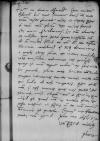List #3584
Andrzej KRZYCKI (CRICIUS) do Ioannes DANTISCUSPułtusk, 1534-04-20
| odebrano [1534]-04-22 Rękopiśmienne podstawy źródłowe:
Pomocnicze podstawy źródłowe:
Publikacje:
| ||||||||
Tekst + aparat krytyczny + komentarz Zwykły tekst Tekst + komentarz Tekst + aparat krytyczny
Reverendissimo meo
Reverendissime mi Domine observandissime.
Cum mitterem
Commendo me fraternae gratiae Vestrae Reverendissimae Dominationis.
Vestrae Reverendissimae Dominationi addictus


 Bcz, 1595, p. 678
Bcz, 1595, p. 678